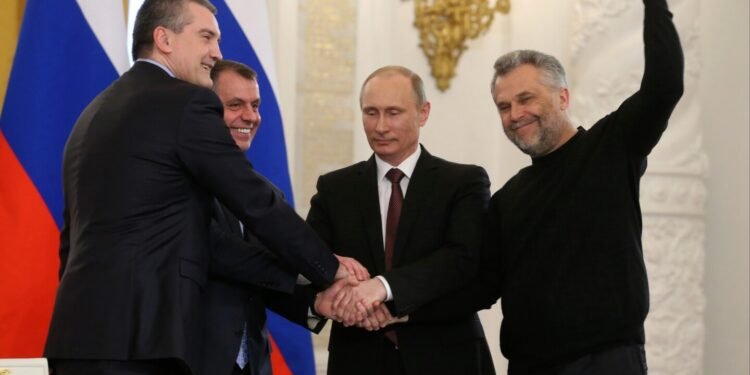A decade ago, President Vladimir Putin seized Crimea from Ukraine, a bold land grab that set the stage for Russia to invade its neighbor in 2022.
The quick and bloodless seizure of the diamond-shaped peninsula, home to Russia’s Black Sea fleet and a popular vacation site, touched off a wave of patriotism and sent Putin’s popularity soaring. “Crimea is ours!” became a popular slogan in Russia.
Now that Putin has been anointed to another six-year term as president, he is determined to extend his gains in Ukraine amid Russia’s battlefield successes and waning Western support for Kyiv.
Putin has been vague about his goals in Ukraine as the fighting grinds into a third year at the expense of many lives on both sides, but some of his top lieutenants still talk of capturing Kyiv and cutting Ukraine’s access to the Black Sea.
The largest conflict in Europe since World War II has sent tensions between Moscow and the West soaring to levels rarely seen during even the chilliest moments of the Cold War.
When he seized Crimea in 2014, Putin said he persuaded Western leaders to back down by reminding them of Moscow’s nuclear capabilities. It’s a warning he has issued often, notably after the start of his full-scale invasion; in last month’s state-of-the-nation address, when he declared the West risks nuclear war if it deepens its involvement in Ukraine; and again on Wednesday, when he said he would use that arsenal if Russia’s sovereignty is threatened.
Analyst Tatiana Stanovaya says Putin feels more confident than ever amid “the Kremlin’s growing faith in Russia’s military advantage in the war with Ukraine and a sense of the weakness and fragmentation of the West.”
The senior fellow at Carnegie Russia Eurasia Center noted that Putin’s speech last month “created an extremely chilling impression of an unraveling spiral of escalation.”
The 71-year-old Kremlin leader has cast the war in Ukraine as a life-or-death battle against the West, with Moscow ready to protect its gains at any cost. His obsession with Ukraine was clear in an interview with U.S. conservative commentator Tucker Carlson, with Putin delivering a long lecture that sought to prove his claim that the bulk of its territory historically belonged to Russia.
He made that argument 10 years ago when he said Moscow needed to protect Russian speakers in Crimea and reclaim its territory.
When Ukraine’s Kremlin-friendly president was ousted in 2014 by mass protests that Moscow called a U.S.-instigated coup, Putin responded by sending troops to overrun Crimea and calling a plebiscite on joining Russia, which the West dismissed as illegal.
Russia then annexed Crimea on March 18, 2014, although the move was only recognized internationally by countries such as North Korea and Sudan.
Weeks later, Moscow-backed separatists launched an uprising in eastern Ukraine, battling Kyiv’s forces. The Kremlin denied supporting the rebellion with troops and weapons despite abundant evidence to the contrary, including a Dutch court’s finding that a Russia-supplied air defense system downed a Malaysia Airlines passenger jet over eastern Ukraine in July 2014, killing all 298 people aboard.
Russian hard-liners later criticized Putin for failing to capture all of Ukraine that year, arguing it was easily possible at a time when the government in Kyiv was in disarray and its military in shambles.
Putin instead backed the separatists and opted for a peace deal for eastern Ukraine that he hoped would allow Moscow to establish control over its neighbor. The 2015 Minsk agreement brokered by France and Germany, following painful defeats suffered by Ukrainian forces, obliged Kyiv to offer the separatist regions broad autonomy, including permission to form their own police force.
Had it been fully implemented, the agreement would have allowed Moscow to use the separatist areas to dictate Kyiv’s policies and prevent it from ever joining NATO. Many Ukrainians saw the deal as a betrayal of its national interests.
Russia viewed the election of political novice Volodymyr Zelenskyy as president in 2019 as a chance to revive the anemic Minsk deal. But Zelenskyy stood his ground, leaving the agreement stalled and Putin increasingly exasperated.
When Putin announced his “special military operation” in Ukraine on Feb. 24, 2022, he hoped the country would fall as quickly and easily as Crimea. But the attempt to capture Kyiv collapsed amid stiff Ukrainian resistance, forcing Russian troops to withdraw from the outskirts of the capital.
More defeats followed in fall 2022, when Russian troops retreated from large parts of eastern and southern Ukraine under a swift counteroffensive by Kyiv.
Fortunes changed last year when another Ukrainian counteroffensive failed to cut Russia’s land corridor to Crimea. Kyiv’s forces suffered heavy casualties when they made botched attempts to break through multilayered Russian defenses.



 Pakistan Rupee Exchange Rate
Pakistan Rupee Exchange Rate





